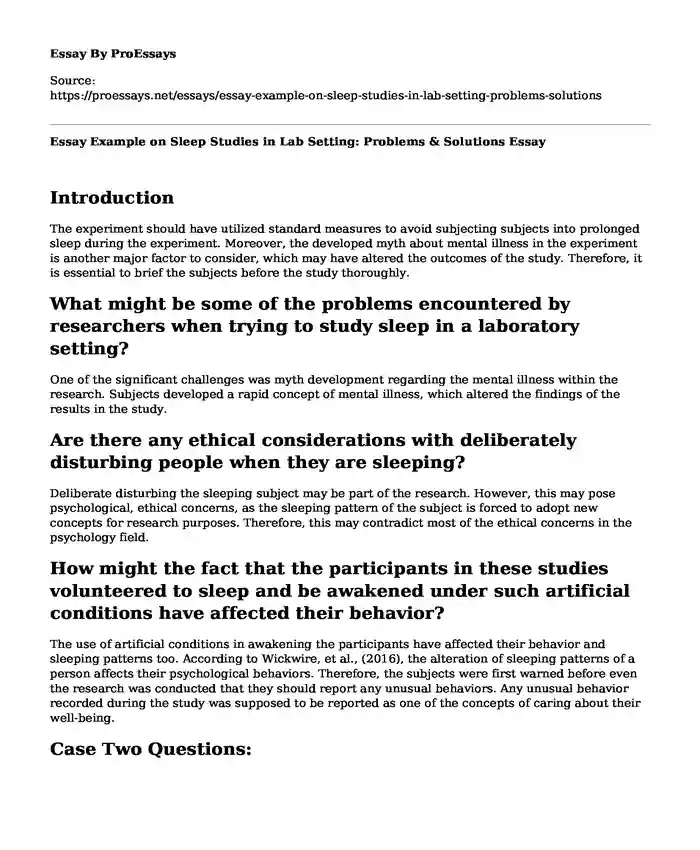Introduction
The experiment should have utilized standard measures to avoid subjecting subjects into prolonged sleep during the experiment. Moreover, the developed myth about mental illness in the experiment is another major factor to consider, which may have altered the outcomes of the study. Therefore, it is essential to brief the subjects before the study thoroughly.
What might be some of the problems encountered by researchers when trying to study sleep in a laboratory setting?
One of the significant challenges was myth development regarding the mental illness within the research. Subjects developed a rapid concept of mental illness, which altered the findings of the results in the study.
Are there any ethical considerations with deliberately disturbing people when they are sleeping?
Deliberate disturbing the sleeping subject may be part of the research. However, this may pose psychological, ethical concerns, as the sleeping pattern of the subject is forced to adopt new concepts for research purposes. Therefore, this may contradict most of the ethical concerns in the psychology field.
How might the fact that the participants in these studies volunteered to sleep and be awakened under such artificial conditions have affected their behavior?
The use of artificial conditions in awakening the participants have affected their behavior and sleeping patterns too. According to Wickwire, et al., (2016), the alteration of sleeping patterns of a person affects their psychological behaviors. Therefore, the subjects were first warned before even the research was conducted that they should report any unusual behaviors. Any unusual behavior recorded during the study was supposed to be reported as one of the concepts of caring about their well-being.
Case Two Questions:
Should sleepwalking be a valid defense for a crime as serious as murder? What about other kinds of crimes?
Murder cases can easily be insulated by the concept of sleepwalking, especially to those having a better idea of how sleepwalking occurs and affects the victim. Therefore, this can be used as a defensive concept for those willing to do harm and slip through the hands of justice. According to Cho, and Duffy, (2019), sleepwalking has become a common nightmare in the nation and across the globe. However, little cases of murder are reported during the incident. Moreover, reviewing the mental state of the sleepwalking victims, there is no close association between them and the desire to murder. Therefore, this theory vehemently denies the interconnection between sleepwalking and committing murder. In the bottom line, there is no closer association between depression and server mental disturbance as per the REM sleep experiment. Therefore, sleepwalking should not be granted as a defense for crimes like murder, or even any other kind of crime.
What kind of evidence should be required to convince a jury that a crime was committed while sleepwalking?
The evidence from a certified psychiatrist may be more compelling, due to their experience in the field, unlike family support, to act as the defendant (Wickwire, et al., 2018). Therefore, the jury needs a critical assessment from the psychologist expert. It made the conclusions about the offender's claim on sleepwalking, rather than relying on uncertified history, that is backed up by inexperienced family members. Moreover, the jury should take into consideration the experience of the psychiatrist in ensuring that sufficient evidence and assessment are fully brought into their attention to reduce the chances of uncertainty.
References
Cho, J. W., & Duffy, J. F. (2019). Sleep, sleep disorders, and sexual dysfunction. The world journal of men's health, 37(3), 261-275.doi.org/10.5534/wjmh.180045
Wickwire, E. M., Schnyer, D. M., Germain, A., Smith, M. T., Williams, S. G., Lettieri, C. J., ... & Badjatia, N. (2018). Sleep, sleep disorders, and circadian health following mild traumatic brain injury in adults: review and research agenda. Journal of neurotrauma, 35(2), 2615-2631.doi.org/10.1089/neu.2017.5243
Wickwire, E. M., Williams, S. G., Roth, T., Capaldi, V. F., Jaffe, M., Moline, M., ... & Pazdan, R. M. (2016). Sleep, sleep disorders, and mild traumatic brain injury. What we know and what we need to know: findings from a national working group. Neurotherapeutics, 13(2), 403-417.10.1007/s13311-016-0429-3
Cite this page
Essay Example on Sleep Studies in Lab Setting: Problems & Solutions. (2023, Sep 11). Retrieved from https://proessays.net/essays/essay-example-on-sleep-studies-in-lab-setting-problems-solutions
If you are the original author of this essay and no longer wish to have it published on the ProEssays website, please click below to request its removal:
- Essay Example on Clinical Support Systems: Enhancing Healthcare Quality & Efficiency
- Firefighters: Mental & Physical Skills to Handle Disasters - Research Paper
- ICT Revolutionizing Healthcare: Nurses' Perspectives - Essay Sample
- Essay on Domestic & International Terrorism: The Unlawful Use of Force & Violence
- Essay on Therapies for Stress & Depression: Psychoanalysis, Psychodynamic, Behavioral, Cognitive, Humanistic & Holistic
- Paper on Older Adults: Mental Health Disorders & Anxiety/Depression
- The Right Age for Drinking or Smoking Onset - Essay Sample







